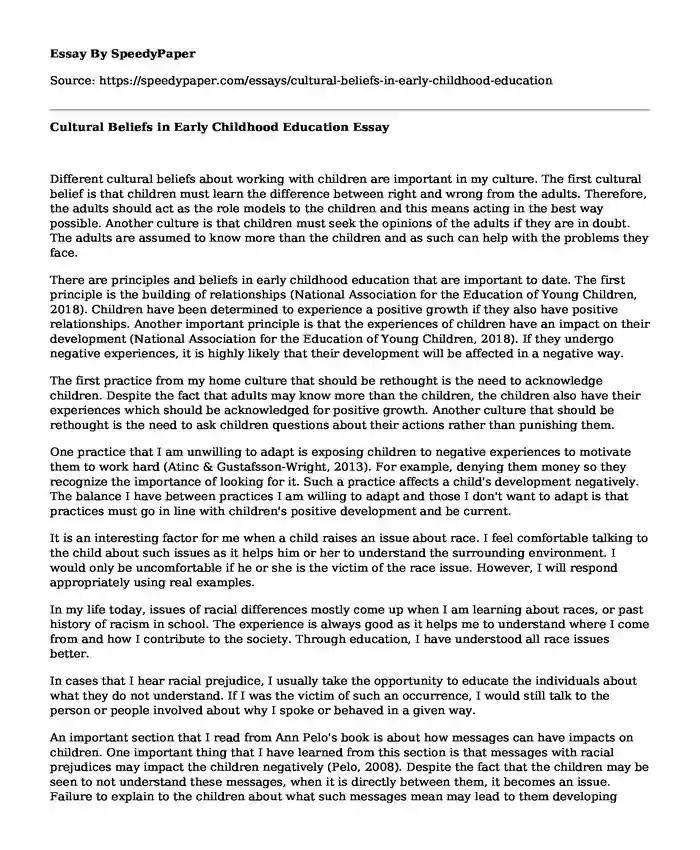
| Type of paper: | Course work |
| Categories: | Culture Child development |
| Pages: | 3 |
| Wordcount: | 632 words |
Different cultural beliefs about working with children are important in my culture. The first cultural belief is that children must learn the difference between right and wrong from the adults. Therefore, the adults should act as the role models to the children and this means acting in the best way possible. Another culture is that children must seek the opinions of the adults if they are in doubt. The adults are assumed to know more than the children and as such can help with the problems they face.
There are principles and beliefs in early childhood education that are important to date. The first principle is the building of relationships (National Association for the Education of Young Children, 2018). Children have been determined to experience a positive growth if they also have positive relationships. Another important principle is that the experiences of children have an impact on their development (National Association for the Education of Young Children, 2018). If they undergo negative experiences, it is highly likely that their development will be affected in a negative way.
The first practice from my home culture that should be rethought is the need to acknowledge children. Despite the fact that adults may know more than the children, the children also have their experiences which should be acknowledged for positive growth. Another culture that should be rethought is the need to ask children questions about their actions rather than punishing them.
One practice that I am unwilling to adapt is exposing children to negative experiences to motivate them to work hard (Atinc & Gustafsson-Wright, 2013). For example, denying them money so they recognize the importance of looking for it. Such a practice affects a child's development negatively. The balance I have between practices I am willing to adapt and those I don't want to adapt is that practices must go in line with children's positive development and be current.
It is an interesting factor for me when a child raises an issue about race. I feel comfortable talking to the child about such issues as it helps him or her to understand the surrounding environment. I would only be uncomfortable if he or she is the victim of the race issue. However, I will respond appropriately using real examples.
In my life today, issues of racial differences mostly come up when I am learning about races, or past history of racism in school. The experience is always good as it helps me to understand where I come from and how I contribute to the society. Through education, I have understood all race issues better.
In cases that I hear racial prejudice, I usually take the opportunity to educate the individuals about what they do not understand. If I was the victim of such an occurrence, I would still talk to the person or people involved about why I spoke or behaved in a given way.
An important section that I read from Ann Pelo's book is about how messages can have impacts on children. One important thing that I have learned from this section is that messages with racial prejudices may impact the children negatively (Pelo, 2008). Despite the fact that the children may be seen to not understand these messages, when it is directly between them, it becomes an issue. Failure to explain to the children about what such messages mean may lead to them developing hatred among each other and this is not good for their development.
References
Atinc, M., & Gustafsson-Wright, E. (2013). Early childhood development: the promise, the problem, and the path forward. Brookings. Retrieved from https://www.brookings.edu/articles/early-childhood-development-the-promise-the-problem-and-the-path-forward/
National Association for the Education of Young Children (2018). 12 principles of child development and learning. Retrieved from https://www.naeyc.org/resources/topics/12-principles-of-child-development
Pelo, A. (2008). Rethinking early childhood education. United States: Rethinking Schools.
Cite this page
Cultural Beliefs in Early Childhood Education. (2022, Apr 11). Retrieved from https://speedypaper.net/essays/cultural-beliefs-in-early-childhood-education
Request Removal
If you are the original author of this essay and no longer wish to have it published on the SpeedyPaper website, please click below to request its removal:
- America Enters the World Stage - Free Essay in American History
- Essay Sample - Ekphrastic Poem Response
- Krudas Cubensi - Free Essay Containing Songs Analysis
- Free Essay with Crime Scene Reconstruction
- Theories for Quality Care: Paper Example
- Paper Example on McDonald's Planning Budget
- Free Essay. Pharmacology: Hypertension
Popular categories




